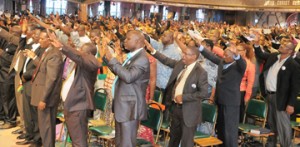On this blog my readers will have noted that I have put forward some outspoken, even uncomfortable statements about the Bible. I have talked about a selective reading of passages from Scripture, finding a point of teaching from a single quotation while ignoring other passages that say something different. The other technique, to which I strongly object, is to suggest that the only valid truth statements are those that are factual and scientific in some way. If the Bible says, to take a random example, that God is going to make the Nile dry up (Isaiah 19.5) then presumably this is something that will have to happen one day because it is in the Bible. For most of us truth statements come in a variety of forms – poetry, drama, story, symbol as well as factual statements. Does it matter that people in America and across the world claim to believe that when the bible makes an apparently factual statement then that is how we have to understand it? Yes I believe it does because in some situations this belief system causes some individuals very real harm.
In the news, as I write, is the report of the Anglican bishops in England who write that they ‘agree to disagree’ on the issue of gay relationships following the Pilling report. Elsewhere in the world the Anglican bishops see this as a total betrayal of Anglican standards. The Archbishops in Nigeria and Uganda, while quoting Scripture, have loudly supported moves to outlaw gay relationships by their respective governments. While the Ugandan authorities seem to be hesitating before signing new measures into law, no such reticence is to be found in Nigeria. Those suspected of homosexual activities are already being rounded up and put in prison. It would not be a total exaggeration to say that ‘the Bible put them there’, even though there are many other factors, cultural, historical and social.
When we examine the rhetoric of these fervent Anglican African leaders on this topic, we frequently find the expression ‘the Bible clearly teaches’. No doubt this is a turn of phrase that is heard in conservative pulpits across the world. When I started to think about this expression I began to realise that this personalisation of the Bible is a nonsense statement. Let me explain what I mean. The Bible is a compilation of writing across many centuries and is enormously varied in the approach it takes to almost any subject you can name. A book cannot anyway teach anything unless it is written by one person over a fairly short period. For me one of the fascinating discoveries of being a Bible student was to discover that Paul changed his teaching over time. If we do not get consistency in this single writer we can name, how can we, or should we, expect consistency within the writings of other anonymous authors over centuries? I would like to see the liberal Anglican bishops argue forcefully against this claim that the Bible has a single view on the gay issue or any other one for that matter.
I could go on to talk about all the things that are in the Bible and we like to avoid noticing, like God commanding the slaughter of women and children but that is not the point I want to end on. I want to come back to the issue of rhetoric and the way that conservative Christians use rhetorical devices to confuse their opponents as well as their followers. When writing about the thinking of George Lakoff in an earlier post, (December 20th) I mentioned that he saw many of the debates between progressive and conservative in American politics being bedevilled by the manipulation and loading of language to suit the conservative point of view. The expression ‘the Bible teaches’ or ‘the Bible clearly states’ is another rhetorical device which needs to be challenged every time it is said. We cannot easily talk or dialogue meaningfully with such crude and unhelpful expressions which are, in the last resort, virtually meaningless statements. We must challenge the person repeating these slogans and suggest that he restate his position to say, ‘in a certain period in Biblical times people believed that the following was the will of God.’ ‘The Bible clearly states’ has to be translated to say, ‘there is a passage which appears to have this understanding of God’s will.’ Having stated it thus we can then go on to have a sensible discussion about whether these ancient insights apply to us or not. I can find numerous ideas from the Old Testament that clearly do not apply to us and each and every moral injunction from those days needs to be tested thoroughly through the prism of Christ’s revelation and the insights of modern understandings.
The Anglican bishops have been under a lot of flak for not coming on one side or the other over the gay question. Perhaps this failure to agree is more helpful than it looks. By agreeing not to agree they are saying loud and clearly that the church as a whole has to live with disagreements. In other words if you want to claim the name Anglican then it is part of the course to recognise that you have to live with people who do not agree with you, without telling them that they are inspired by satanic thinking. Anglicanism needs to exorcise intemperate intolerance. If the conservative churches in Africa and elsewhere continue to condemn those who disagree with them, then they may need to be a parting of the ways. There is only so long that anyone can live with another person who is unable to see any goodness or light within you.




